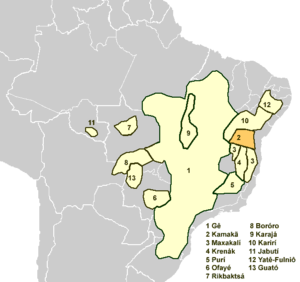Kamakã languages

| Kamakã | |
|---|---|
| Kamakanan | |
| Geographic distribution | Bahía, Brazil |
| Linguistic classification | Macro-Jê
|
| Language codes | |
| – | |
| Glottolog | kama1371 |
 | |
The Kamakã languages are a small family of extinct Macro-Jê languages of Bahía, northeastern Brazil. The attested Kamakã languages are:
Varieties
[edit]Loukotka (1968)
[edit]Below is a full list of Kamakã languages and dialects listed by Loukotka (1968), including names of unattested varieties.[1]
- Southern
- Kamakán / Ezeshio - once spoken on the Ilhéus River, De Contas River and Pardo River, Bahia state.
- Mangaló / Mongoyo / Monshoko - extinct language once spoken on the lower Pardo River near the frontier of Bahia and Minas Gerais states.
- Kutasho / Cotoxo / Catathoy - once spoken between the Pardo River and De Contas River.
- Menien / Manyã - once spoken at the sources of the Jequitinhonha River.
- Dendi - once spoken in the Serra Geral de Condeúba, frontier area between the states of Bahia and Minas Gerais. (Unattested)
- Catolé - once spoken in the state of Minas Gerais in the valleys of the Pardo River and Verde River. (Unattested)
- Imboré / Amboré - once spoken at the sources of the Gongogi River, Bahia state. (Unattested)
- Piripiri - once spoken in the state of Minas Gerais in the valleys of the Verde River and Gorutuba River. (Unattested)
- Payaya - once spoken on the Camamu River, Bahia state. (Unattested)
- Northern
- Masacará - extinct language once spoken south of the city of Juazeiro and in the old mission of Saco dos Morcegos, state of Bahia.
Mason (1950)
[edit]Camacán (Kamakán) varieties listed by Mason (1950):[2]
- Camacán (Kamakán)
- Mongoyó
- Monshocó (Ezeshio)
- Cutashó (Kotoxó)
- Catethoy (Katathoy)
- Menián (Manyá)
- Masacará
Classification
[edit]Martins (2007)
[edit]Internal classification of the Kamakã languages by Martins (2007):[3]
- Kamakã
Masakará is the most divergent language.
Ramirez (2015)
[edit]Internal classification of the Kamakã languages according to Ramirez, et al. (2015):[4]
Nikulin (2020)
[edit]Internal classification of the Kamakã languages according to Nikulin (2020):[5]
Vocabulary
[edit]Loukotka (1968) lists the following basic vocabulary items.[1]
gloss Kamakan Mangaló Menien Kutasho Masacará head heró hero inro heró axaró eye an-kedó kedó im-gutó kithó gätxt tooth txó dió yo dió thüó foot wadé uadä hoata huaxtö water d san sa sa sin tsyin fire yakó diaxka yarú tiakíl guxá star pʔiong péo pinia pião pinatsö maize hikamhi kesho kshó kethió käxü jaguar yakoe-dere yaké-deré kukiamú tiuké-hiá yakveo black kohada koaxéda kuatá tá koeixtá
Proto-language
[edit]| Proto-Kamakã | |
|---|---|
| Reconstruction of | Kamakã languages |
Reconstructed ancestors | |
Proto-Kamakã reconstructions by Martins (2007):[3]
Portuguese gloss
(original)English gloss
(translated)Proto-Kamakã água water *tsã andar to walk *mã anta tapir *here arara macaw *tʃoke arco bow *kwã árvore tree *hi banana banana *tako beber to drink *ka beber (água) to drink (water) *tsã-ka belo beautiful *tʃoho boca mouth *eriko branco white *kVhVro cabeça head *hero cabelo hair *ke carne meat *kohoaja casa house *toa chuva rain *tsã comer to eat *jukwa dente tooth *tʃo dormir to sleep *hondõ esp. de banana banana sp. *tako estrela star *pio faca knife *ketʃa, *ketja feijão bean *kinja filha daughter *kiaxrará filha, filho daughter, son *krani filho son *ketje flecha arrow *hwaj, *waj fogo fire *tʃakɨ, *tjakɨ irmã sister *tʃakarata, *jak(a)ratã lua moon *hetʃe, *hedje macaco monkey *kaũ machado axe *kedo madeira wood *hi)-ta mandioca manioc *kajɨ mão hand *ker menino boy *kwanĩ milho maize *ketʃo milho maize *ketjo muito very *hie-hie nariz nose *niniko olho eye *keto onça (Felis onça) jaguar (Felis) *jake orelha ear *nikoka pai father *kehentã papagaio parrot *karaj pássaro bird *tʃano pequeno small *(V)ta preto, negro black *kwahda, *kwaxda quati coati *pitako
References
[edit]- ^ a b Loukotka, Čestmír (1968). Classification of South American Indian languages. Los Angeles: UCLA Latin American Center.
- ^ Mason, John Alden (1950). "The languages of South America". In Steward, Julian (ed.). Handbook of South American Indians. Vol. 6. Washington, D.C., Government Printing Office: Smithsonian Institution, Bureau of American Ethnology Bulletin 143. pp. 157–317.
- ^ a b Martins, Andérbio Márcio Silva. 2007. Revisão da Família Lingüística Kamakã Proposta por Chestmir Loukotka. MA thesis, University of Brasília.
- ^ Ramirez, H., Vegini, V., & França, M. C. V. de. (2015). Koropó, puri, kamakã e outras línguas do Leste Brasileiro. LIAMES: Línguas Indígenas Americanas, 15(2), 223 - 277. doi:10.20396/liames.v15i2.8642302
- ^ Nikulin, Andrey (2020). Proto-Macro-Jê: um estudo reconstrutivo (PDF) (Ph.D. dissertation). Brasília: Universidade de Brasília.
- Alain Fabre, 2005, Diccionario etnolingüístico y guía bibliográfica de los pueblos indígenas sudamericanos: KAMAKÃ.[1]